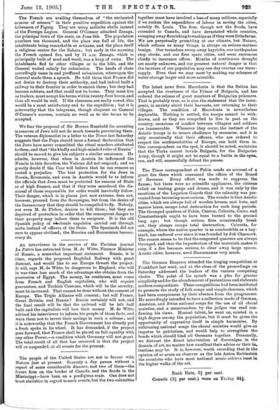The German Emperor attended the singing competition at Frankfurt last
week, and at the close of the proceedings on Saturday addressed the leaders of the various competing choirs. The point of his speech was a plea for greater simplicity and for the abandonment of pretentious and elaborate modern compositions. These competitions had been instituted to promote the study of folk-songs and simple choruses, which had been conspicuous by their absence from the programme. He accordingly intended to have a collection made of German, Austrian, and Swiss national songs for the use of all choral societies, and a memorandum by the judges was read con- firming his views. Musical talent, he went on, existed in a high degree among the population, but it must be given the opportunity of expressing itself in simple harmonies. By cultivating national songs the choral societies would give an impetus to patriotism, and would help to strengthen the bonds which should bind all Germans together. Personally, we distrust the direct intervention of Sovereigns in the domain of art, no matter how excellent their advice or their in. tentions may be. It is, however, worth recording that in the opinion of so acute an observer as the late Anton Rubinstein the countries who have most national music achieve least in the higher walks of the art.










































 Previous page
Previous page